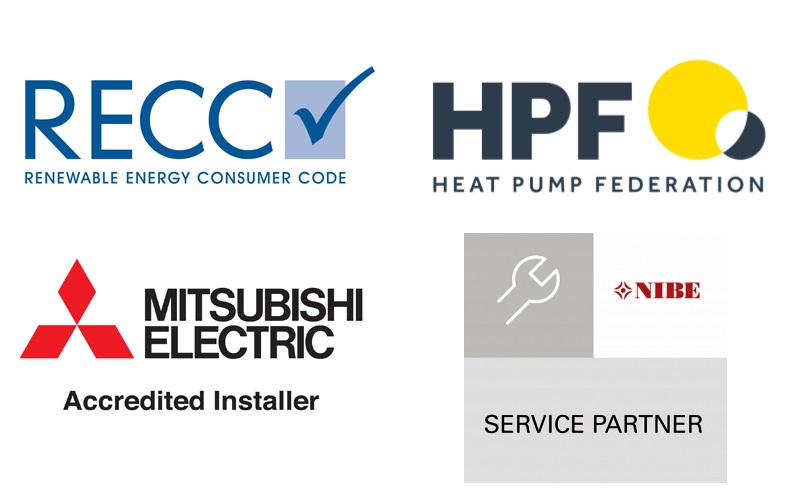Can We Help?
We’ve provided some troubleshooting information to help you determine what could be happening with your heat pump
Please note; these are to be used as a guide only. We’ve listed the most common findings in our experience and is not an exhaustive list of what could be happening. You’ll find some simple pointers on what to listen out for or to visually monitor, in order to provide as much information as possible to a qualified engineer.
Our expert knowledge stems from many years of experience, though we do use references from user manuals in parts. If you have a copy of your unit’s manual, we’d advise giving it a read to familiarise yourself with control panels etc. In all cases, we do not recommend that you open up or tamper with your unit. Please leave thorough investigation to a specialised engineer for your own safety.
- Ground Source Heatpumps
- Air Source Heat Pumps
- Heat Recovery Units
- Swimming Pool Pumps
- Non-Specific Unit Issues
Technical Reset
Before you call out an engineer – try turning the system off for a short period of time (10mins to 30mins) and then turn it back on. Occasionally, electrical relays get stuck and just need re-setting. This may be all you need and will save you the fee for a call out.
Ground Source Heat Pumps
HP/LP Alarm: Commonly referring to there being an issue with flow; high pressure/low pressure
HP Alarms,in general, indicate a flow issue leaving the heat pump to either the hot water, or the heating system. In other words; a restriction of some sort, preventing the intended flow/return to and from the heat pump. This could simply be a blocked filter, (cleaned as part of our annual servicing program)which can collect particles, that will restrict flow, at any time.Alternately, the issue could be down to a faulty pump or faulty valve.
It’s also worth checking the heating circuit pressure, which should be around 1.5 bar at all times.
LP Alarms frequently indicate a flow issue coming into the heat pump from the ground array (outside pipes in the ground).This may signify that either a faulty pump or faulty valve is to blame. Other possible common diagnoses could suggest a restricted filter or glycol (antifreeze fluid) issue.
Something that happens slightly more infrequently under an LP alarm, could see an issue with the refrigeration circuit. This can only be properly diagnosed by a suitably qualified F GAS engineer.
If you hear any unusual noises coming from a valve or pump, or the pump itself is very hot, a general indication would be of a component seizure, (be careful, can burn if touched).
In all cases if the alarm persists,try a Technical Reset first; If this is unsuccessful and your issue remains, we’d advise making an appointment for an engineer to attend and assess the unit. Contact Us.
Potential Glycol Leak: referring to the antifreeze in the ground array
Glycol (antifreeze) is the fluid running around the ground array and if the system develops a leak this can be catastrophic to the system operation.
There are two types of systems:(1) a pressurised and (2) non-pressurised installation.
Pressurised can be identified as having an expansion cylinder and a pressure gauge to indicate the pressure of the ground array; 1-2 Bar.
The non-pressurised installation will normally have an expansion vessel (clear pot with fluid in) which needs to be about half full.
If on the pressurised installation the pressure gauge is reading zero, this can indicate fluid loss somewhere. Similarly, on the non-pressurised installation, if there is little or no fluid in the vessel this can indicate fluid loss in the system which needs to be investigated by a qualified engineer.
If you can identify fluid deposits around the heat pump installation (that clearly isn’t water), it may indicate a leak issue that is within the plant room or the heat pump connections itself.
Other than that, we can only assume the leak is outside of the plant room and is an issue with either the pipe connections to the ground array, or (less likely) a failure of the ground pipework itself. An example of when ground pipework could be affected would be if any recent ground works had taken place i.e. having fences erected near the site.
Note: A small amount of fluid needing to be added infrequently is quite acceptable due to pressure and temperature fluctuations. But the constant pressure loss and need to add fluid indicates a more fundamental issue with the integrity of the ground array and will require attention. Contact Us.
Air Source Heat Pumps
HP/LP Alarm: Commonly referring to there being an issue with flow; high pressure/low pressure
HP Alarms, in general, indicate a flow issue leaving the heat pump to either the hot water, or the heating system. In other words; a restriction of some sort, preventing the intended flow/return to and from the heat pump. This could simply be a blocked filter, (cleaned as part of our annual servicing program) which can collect particles, that will restrict flow, at any time. Alternately, the issue could be down to a faulty pump or faulty valve.
It’s also worth checking the heating circuit pressure, which should be around 1.5 bar at all times.
LP Alarms frequently indicate a flow issue coming into the heat pump. If the fan is still operating as usual, it’s most likely that there is an issue with the refrigeration circuit.This can only be properly diagnosed by a suitably qualified F GAS engineer.
In all cases if the alarm persists,try a Technical Reset first; If this is unsuccessful and your issue remains,we’d advise making an appointment for an engineer to attend and assess the unit. Contact Us.
MP Alarm: ANY Heat pump system. Refers to an electrical issue, whereby the internal protection system has tripped
MP alarms indicate the heat pumps electrical protection devise has tripped to protect other vital components.
This can happen frequently when properties are located remotely, with an inconsistent electrical supply, or otherwise during an electrical storm. These alarms can normally be reset; dependant on the type of unit some will just need the Technical Reset and some will need the circuit breaker to be manually reset.
Another possibility, is that there is a failure of a component within the heat pump itself, which will be more likely if the alarm cannot be reset or continues to alarm more frequently.
If the alarm persists; we’d advise making an appointment for an engineer to attend and assess the unit. Contact Us.
Heat Recovery Units
Click to view our heat recovery units help PDF.
Swimming Pool Pumps
Non-Specific Unit Issues
High Electricity Bills
Have you been altering the temperature setting on your unit? Frequently turning this up and down uses more electricity that you think. Your unit is designed to maintain a consistent temperature, which uses less power.
If the temperature setting is too low, your immersion heater will assume it’s required to be used to heat your water etc. As this uses electricity to do so, your consumption of electricity will be much higher. Too high and your heat pump will work harder to bring the temperature down to the right level, thus also using more electricity.
When was your last service on the unit? It’s important to take good care of your heat pump, as some of the components are quite delicate. Improper usage, such as a prolonged high demand, can impair the performance of parts which effects their ability to work efficiently.
We advise that you get your unit serviced annually, so that your system can be checked over, cleaned and topped up as required. Book your service in now. Contact Us.
High Water Consumption / Bills
This suggests there could be a valve failure or potential leak somewhere in your system.
Check all visible areas for signs of water, either pooling or damp spots that are unusual.
Also check, if accessible, your water meter.If this is indicating water flow but you are not using any water, we would suggest that this definitely indicates a possible valve failure.
As water can be very damaging to its surrounding areas, if you suspect the above, we’d advise to get in contact with us to discuss further, or arrange an inspection of your unit.
Be advised; your water supplier will charge you for every litre of water lost and therefore once you suspect an issue, you should act quickly to investigate, as bills can become excessive very quickly. Contact Us.
No Heating (Specifically)
If your system is operating as expected i.e. no hot water issues or alarms, but you are experiencing a heating problem, the first thing you should check, is that your system is set to the correct operating mode.
Most systems will have a summer or winter mode setting. As with most heat pumps, systems are weather compensated, and are effectively designed to take into account the outside temperature.From this, the settings within the unit, will then automatically send a calculated flow to the heating system connected- dependant on the outside air temperature.
Typically, the range of water temperature flow to any heating system is around 20’c- 50’c, therefore, the radiators may not necessarily ‘feel hot’. Heat pump systems are designed to maintain ambient comfortable room temperatures of 18’-21’c all year round.
Please note; in most cases your heating system will have its own independent control system not connected or controlled by the heat pumps operating system. We would ask that you try and confirm that the heating control system is working before asking for an engineer’s visit.
Check that the heating control system is turned on and that the room stats are set correctly (i.e. calling for heat). It’s important to say, that even if all is working as expected, there still could be an issue with the heating controls. We find that it’s very common to find actuators or room stats not working correctly. During our annual service of your heat pump system we will always visually look at your heating controls to ascertain that they are working. Should we subsequently identify any issues with your heating controls, we will endeavour to replace or repair as required at reasonable cost.
To investigate further, if you are still experiencing issues, contact us.
No Heating or Hot Water
Unfortunately, there are multiple reasons for no heat production and each unit will have its individual case as to why. Some of these have been covered – see HP/LP Alarms, MP Alarm and also check your unit display for any other indications that may help diagnosis.
If none of these appear to be applicable, we’d advise for you always try the Technical Reset method on the system in the first instance. If the issue persists, we’d advise making an appointment for an engineer to attend and assess the unit. Contact Us.






